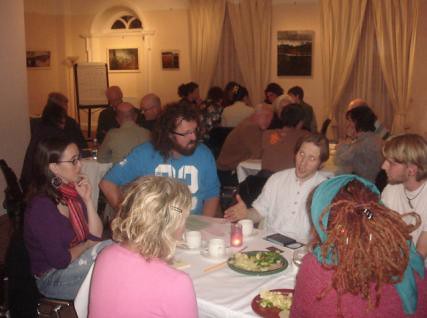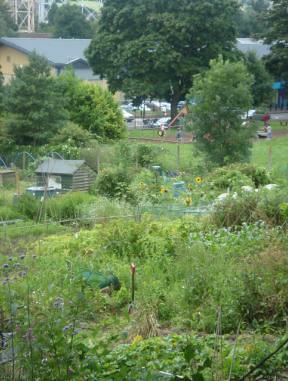Recent Posts
 It is a sign of the times when a leading publication like the New Scientist runs an issue with 15 inside pages and it’s front cover questioning economic growth. What would have been heresy only last year is now mainstream. Even “peak oil” and “transition towns” get a mention!
It is a sign of the times when a leading publication like the New Scientist runs an issue with 15 inside pages and it’s front cover questioning economic growth. What would have been heresy only last year is now mainstream. Even “peak oil” and “transition towns” get a mention!
The lead article sets the scene with the following question:
“How do we square Earth’s finite resources with the fact that as the economy grows, the amount of natural resources needed to sustain that activity must grow too? It has taken all of human history for the economy to reach its current size. On current trends it will take just two decades to double.”
 We had great feedback from our Transition Town Update evening with many people saying that it was the most enjoyable event so far!
We had great feedback from our Transition Town Update evening with many people saying that it was the most enjoyable event so far!
Central to the evening was the “Big Hand” exercise that explored how we might “power down” under the different themes of Energy, Waste, Food, Housing, Transport and so on.
It was a bit like a World Cafe event but on a smaller scale that worked well given the limited amount of time. Below the fold is a short summary of the exercise for other transition groups to copy or adapt.
 The Green Screen kicked off last Thursday in Cleere’s Pub with “A Crude Awakening”. There was a great turnout with many new faces.
The Green Screen kicked off last Thursday in Cleere’s Pub with “A Crude Awakening”. There was a great turnout with many new faces.
As usual the evening was more than simply a film screening. We started off with a “speed date” exercise whereby each person was given a slip of paper with a one-liner explaining some aspect of the transition town movement. Each person was then asked to introduce themselves to a person they didn’t know and read out their one-liner to each other. Once finished, move on and find another partner. The game really breaks the ice and a good way to meet new people.
The film itself, although a bit sensational, is an excellent look at Peak Oil. Given the high oil spike early in the year and the subsequent shock to the world economy it was sobering to watch Colin Cambell predict in 2005 that peak oil could trigger the next great depression. The downside to the film is that it doesn’t bring in Climate Change or any other ecological issue.
After the screening Vered Zur facilitated a discussion posing three questions:
Q1- What concerns did the film raise for you?
Q2 – What would you like to see happen in Kilkenny?
Q3 – What steps can you take to make this happen?
I have collected some of the comments here.
Next up is the excellent “Power of Community” on Wed 22nd. Its a much more positive film about how Cuba survived a kind of artificial peak oil after the collapse of the Soviet Union and the imposition of the US trade embargo.
You can download the full Green Screen program here.
Pat Fleming from Clonmel’s Transition Initiative passed on this to us. It is a short documentary on the absurdity of our current debt based money system and puts into perspective what is happening now in the financial markets.

- Allotment gardens in Victoria Park, Bath. Could we see this in Kilkenny Castle gardens someday? If the UK have their allotments – why can’t we?
On 25th September Malcolm Noonan held the inaugural meeting of the Kilkenny Allotments association at the Citizens advice centre. The meeting was packed with over 40 people in attendance, many of whom had to stand at the door. Future Proof Kilkenny was invited along to put in context the need for localised food production systems in order to reduce our carbon footprint and to prepare ourselves for consequences of peak oil. Shirley Lanigan , regular garden columnist at the People spoke about the health and community benefits of growing your own food.
Working from memory, here are some of the points people raised during the discussion afterwards:
- Under the Allotments act of 1932 the Council is obliged to find local land for the purposes of an allotment.
- Under new Biodiversity Act an allotment garden could play a part in preserving biodiversity.
- Any allotment must be within cycling and walking distance.
- All allotments must be organic.
- Ultimately, allotments and the space to grow food locally, should be a requirement of the planning process.
- Providing edible landscapes and schoolyards, tree planting and re-establishing Kilkenny orchards should also be on the agenda.
The next step is to organise a field trip to an existing allotment, probably one in Dublin or Meath. If you are interested in this field trip contact malnoonan[at]eircom.net
Web links
UK Federation of City Farmes and Community Gardens
